Tea is a treasure—you won't know its value until you try it.
The health benefits and wellness effects of tea are summarized here for everyone today.
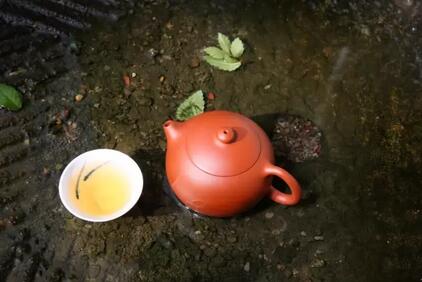
Tea can reduce the risk of cardiovascular diseases and mortality.
A recent study from Japan tracked over 40,000 middle-aged and elderly individuals from 1994 onwards and found that, compared to those who drank less than one cup of tea per day, men who drank five or more cups of green tea daily had a 22% lower average risk of dying from cerebrovascular disease, while women saw a 31% reduction. The most significant decline was in cerebral infarction, with a 42% drop for men and 62% for women. According to the UK's Daily Mail, a new study found that drinking three cups of tea daily can reduce the risk of myocardial infarction by 70%. Research from Finland and France also shows that drinking 2-3 cups of tea per day can lower the risk of stroke.
Tea helps lower cholesterol and blood pressure.
Researchers at the University of Hong Kong found that tea can reduce total blood cholesterol levels by 25%. Another study on the relationship between tea consumption and hypertension found that the incidence of high blood pressure was 10.55% among non-tea drinkers, compared to 6.95% among regular tea drinkers, confirming tea's mild blood pressure-lowering effect.

Tea aids in preventing early-onset Alzheimer's.
Tea protects brain cells and effectively delays brain degeneration, helping maintain vascular health in the brain. Recent studies suggest that drinking more tea can improve memory and prevent early-onset Alzheimer's.
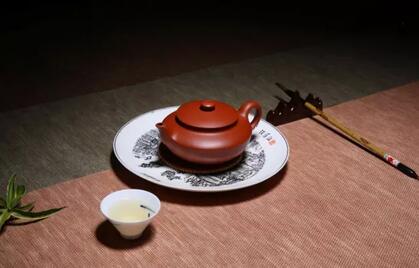
Tea has anti-stress and anti-anxiety effects.
Modern life and work are fast-paced and stressful, often leading to anxiety, tension, irritability, depression, and other psychological symptoms. Green tea contains L-theanine, a relaxing agent without sedative effects, which helps the brain produce gamma waves. Gamma waves can help control anxiety, improve focus, and enhance mental state and overall function. Typically, 3-4 cups of green tea contain 100-200 mg of L-theanine, making green tea effective for stress and anxiety relief.
Tea boosts immunity.
If there's a flu outbreak, drink more tea. Harvard University researchers found that people who drank five cups of tea daily for two weeks produced large amounts of antiviral interferon—10 times more than non-tea drinkers. This infection-fighting protein enhances immunity and helps the body resist flu.
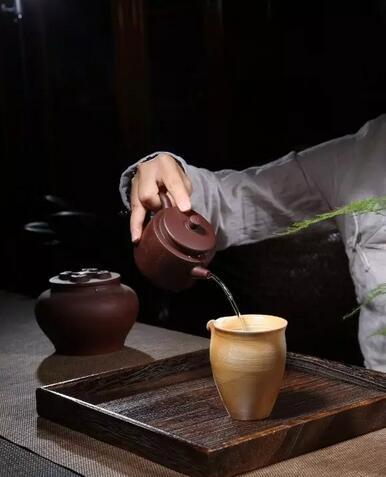
Other health benefits of tea.
Tea also relieves fatigue, refreshes the mind, improves vision, aids digestion, detoxifies, prevents tooth decay, eliminates bad breath, and is an alkaline beverage that helps correct acidic body conditions... Tea is undoubtedly the healthiest drink of the 21st century.
Tea's significant contributions to human health are undeniable, but before the 19th century, no one could explain why tea had so many functions. Starting in the 1960s and 1970s, science began exploring this ancient and mystical field, analyzing the compounds in tea to unlock its secrets.
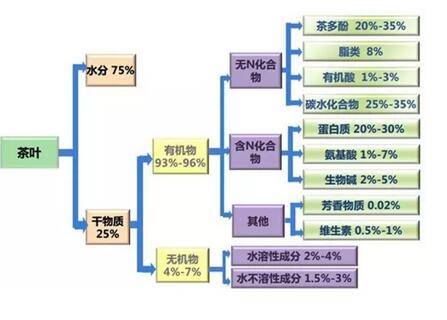
The diagram shows that tea leaves contain 75% water, which explains the saying, "4 pounds of leaves make 1 pound of tea." Water-soluble substances account for 30%-48% of tea, including polyphenols, alkaloids, amino acids, sugars, and organic acids, which determine tea's quality and flavor.

Polyphenols.
Polyphenols are widely found in nature, with well-known examples like tea polyphenols, apple polyphenols, and grape polyphenols. Due to their antioxidant properties, they are widely used in cosmetics and pharmaceuticals.
Tea polyphenols are one of the main components shaping tea's color, aroma, and taste, as well as one of its key health benefits. They are abundant, widely distributed, and highly variable, significantly influencing tea quality. Tea polyphenols include catechins, anthocyanins, flavonoids, flavonols, and phenolic acids, with catechins being the most abundant and important. Studies show that drinking a cup of tea increases blood antioxidant capacity (against free radicals) by 41%-48% within half an hour, maintaining this effect for 90 minutes.
Polyphenols account for about one-third of dry tea leaves and three-quarters of tea infusion solids. They are highly reactive and can undergo chemical reactions under external conditions, forming new compounds that affect tea quality. Thus, the oxidation level of polyphenols is a key factor in tea classification.
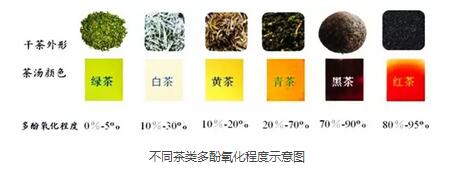
Diagram of polyphenol oxidation levels in different tea types.
Polyphenols are the main component of water-soluble pigments in tea, contributing to the color of tea liquor and dry leaves. They also play a key role in the astringency of tea, along with their oxidation products, aldehydes, and iron. Catechins are particularly important in this aspect.

Tea amino acids.
Tea contains over 20 amino acids, including theanine, glutamic acid, and aspartic acid. Theanine is crucial for tea's aroma and umami taste, accounting for more than 50% of free amino acids in tea. Its water-soluble compounds contribute to sweetness and suppress bitterness. Japan approved theanine as a food additive in 1964.
Theanine can be extracted from tea or synthesized biologically or chemically. Due to its benefits—lowering blood pressure, promoting relaxation, improving sleep, and enhancing brain function—theanine is used in health foods and medicines.

2. How to choose tea for different needs?
1. For mental work: Drink green tea. Green tea helps fight cancer, lowers cholesterol, and prevents atherosclerosis. It benefits those exposed to toxins or pollution, smokers, drinkers, young adults in growth phases, and mental workers by enhancing alertness, focus, and memory. It suits those with yin-deficient constitutions and those seeking weight loss or beauty. Pregnant women should drink mild green tea.
2. For physical activity: Drink black tea. Black tea is warming, ideal for the weak, athletes, and laborers. Adding sugar provides extra energy. It's also suitable for women in late pregnancy and postpartum.
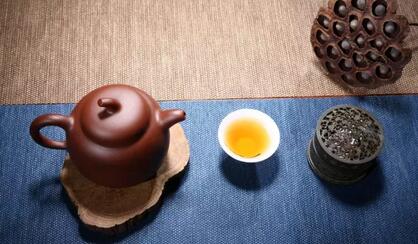
3. For weight loss: Drink oolong tea. Oolong tea lowers lipids, prevents atherosclerosis, and promotes longevity. It suits the obese, those on high-fat diets, and those with yang-deficient or weak spleen/stomach constitutions.
4. For meat-heavy diets: Drink dark tea. Dark tea aids digestion of fatty foods and suits weight-loss seekers. In some ethnic and border regions, compressed teas like Pu-erh are traditional staples.
5. For mood swings: Drink floral tea. Floral tea helps mental workers relieve depression and stress. It suits those with yang-deficient or weak spleen/stomach constitutions, as well as menstruating or menopausal women by soothing irritability and regulating qi.
That's the summary for now. More information will be shared later.
Tea's chemical components determine its quality and health effects, which result from the synergy of multiple compounds, not just one.
Drinking more tea reveals its mysteries. So, have you had tea today?